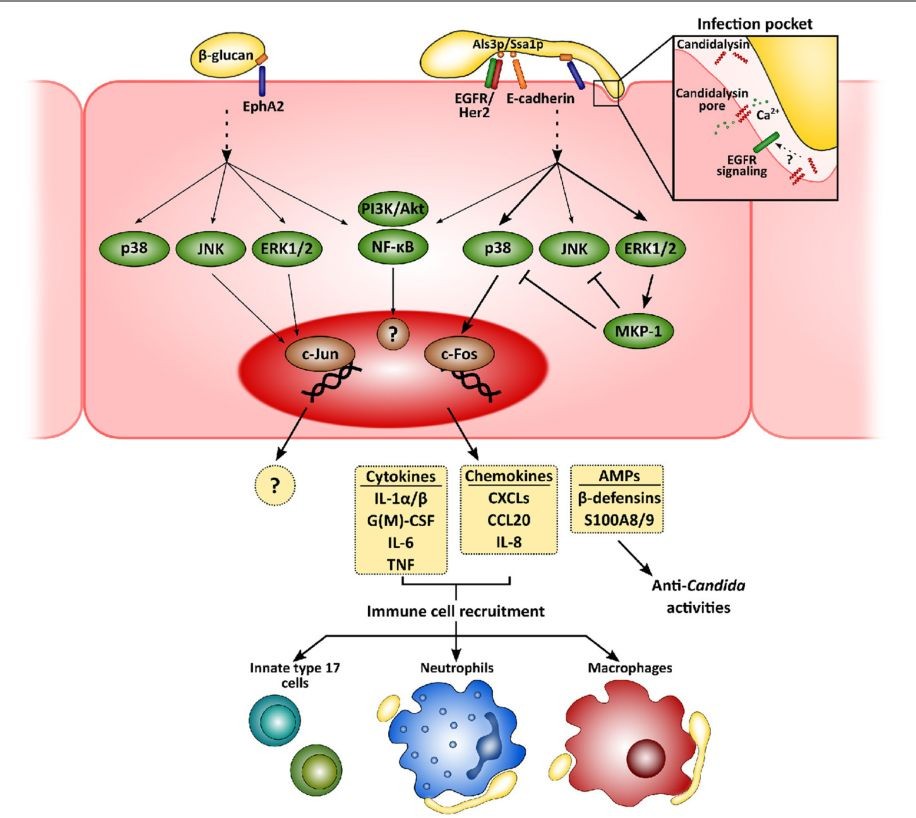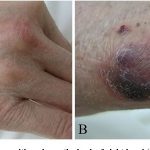
Contents
Candida albicans skin test antigen
Candida albicans skin test antigen is used to determine a person’s immune response to allergens and substances that stimulate the immune system to produce antibodies. A positive response to the test indicates that the individual has a normal cell-mediated immune (CMI) response. Many diseases and immune disorders can affect the body’s CMI response.
Candida albicans is a type of fungus that lives on the human body, but overgrowth can cause infection. The skin test antigen is prepared from the culture filtrate and cells of two strains of C. albicans. When injected into the skin, it typically causes tissue hardening (induration) that starts within 24 hours and peaks between 24 and 48 hours.
The skin test is frequently used as a control test for tuberculosis in patients who test negative for tuberculin skin test, to rule out absence of immune reaction to tuberculin as a possible factor. It produces positive delayed type hypersensitivity (DTH) in healthy individuals, but immune response may be altered in persons with disorders such as immunodeficiencies, cancer, malnutrition, and viral and fungal diseases.
Some individuals with normal cellular immunity may not have a positive reaction to the skin test. In such cases, concurrent use of other licensed cell-mediated hypersensitivity skin test antigens is recommended. The skin test antigen should not be used to diagnose or treat Type 1 allergy to Candida albicans.
Warnings
- Do not administer the skin test antigen to individuals who have had a prior extreme hypersensitivity or allergy to C. albicans antigen or to another similar product.
- Do not use the skin test antigen to diagnose or treat Type 1 allergy to Candida albicans.
- Use separate sterile syringe and needle for each patient to prevent transmission of infectious agents. Dispose of needles properly and do not recap them.
- Administer the antigen into the skin as superficially as possible. Administration into the tissue below the skin can produce unreliable results. Do not administer intravenously, and exercise particular care to avoid injecting into a blood vessel.
- The skin test can cause serious and sometimes life-threatening reactions. Administer it in a clinical setting where facilities, medications, and trained personnel are immediately available to manage serious systemic reactions, should they occur.
- Some patients may have an immediate hypersensitivity reaction and persons with bleeding tendency may have bruising and non-specific induration due to trauma of the skin test. Local and systemic allergic reactions can occur.
Side effects of Candida albicans skin test antigen
Common side effects include:
- Local reactions such as swelling, redness, itching, blistering, and skin peeling
- Sneezing, coughing, itching, abdominal cramps, vomiting, and diarrhea
- Severe allergic reactions such as shortness of breath, low blood pressure, rapid heart rate, and respiratory failure
Report suspected adverse reactions to Nielsen BioSciences, Inc. or MEDWATCH, Food and Drug Administration.
Call your doctor immediately if you experience any of the following symptoms or serious side effects:
- Serious heart symptoms such as fast or pounding heartbeats, fluttering in your chest, shortness of breath, and sudden dizziness
- Severe headache, confusion, slurred speech, severe weakness, vomiting, loss of coordination, feeling unsteady
- Severe nervous system reaction with very stiff muscles, high fever, sweating, confusion, fast or uneven heartbeats, tremors, and feeling like you might pass out
- Serious eye symptoms such as blurred vision, tunnel vision, eye pain or swelling, or seeing halos around lights
This is not a complete list of all side effects or adverse reactions. Call your doctor for medical advice about serious side effects or adverse reactions. You may also report side effects or health problems to the FDA.
Dosage for Candida albicans skin test antigen
Solution for intradermal injection
Candin
- 1 mL multi-dose vial
Adult:
Cellular immune response to Candida albicans
- Indicated for use as a recall antigen for detecting cell-mediated hypersensitivity by intracutaneous testing.
- Intended to elicit an induration response 5 mm or larger in immunologically competent persons with cellular hypersensitivity to the antigen
Administration
- Administer intradermally on the volar surface of the forearm or on the outer aspect of the upper arm.
- The test dose is 0.1 mL.
- The skin should be cleansed with 70% alcohol before applying the skin test.
- The intradermal injection must be given as superficially as possible causing a distinct, sharply defined bleb.
- An unreliable reaction may result if the product is injected subcutaneously.
- A positive delayed-type hypersensitivity reaction to the skin test antigen consists of induration of 5 mm or larger.
Overdose
Overdose or accidental intravenous injection has the potential to cause severe allergic reactions. Overdose may be treated with epinephrine and other medications and oxygen, as required.
Drug interactions
Inform your doctor of all medications you are currently taking. Never begin, discontinue, or change the dosage of any medication without your doctor’s recommendation.
Candida albicans skin test antigen may have interactions with:
- Corticosteroids and immunosuppressive drugs
- Beta-blocking drugs
The drug interactions listed above are not all of the possible interactions or adverse effects. For more information, visit the RxList Drug Interaction Checker.
It is important to always tell your doctor, pharmacist, or health care provider of all medications you use, and keep a list of the information. Check with your doctor or health care provider if you have any questions about the medication.
Pregnancy and breastfeeding
- No animal reproduction studies have been conducted and it is not known if Candida albicans skin test antigen can cause fetal harm if administered to a pregnant woman or if it can affect reproduction capacity.
- Candida albicans skin test antigen should be used during pregnancy only if it is clearly needed.
- It is not known if Candida albicans skin test antigen is present in breastmilk. Use with caution in nursing mothers because many drugs are excreted in breastmilk.
Additional information
- The skin test can cause local reactions that should resolve in a few days. If reactions persist or worsen, or if you develop systemic reactions, report to your physician.
By clicking Submit, I agree to the MedicineNet’s Terms & Conditions & Privacy Policy and understand that I may opt out of MedicineNet’s subscriptions at any time.
Summary
Candida albicans skin test antigen is used to determine a person’s immune response to allergens and substances that stimulate the immune system to produce antibodies. It is prepared from a type of fungus that lives on the human body, but overgrowth can cause infection. Common side effects include swelling, redness, itching, blistering, sneezing, coughing, abdominal cramps, vomiting, and diarrhea.


